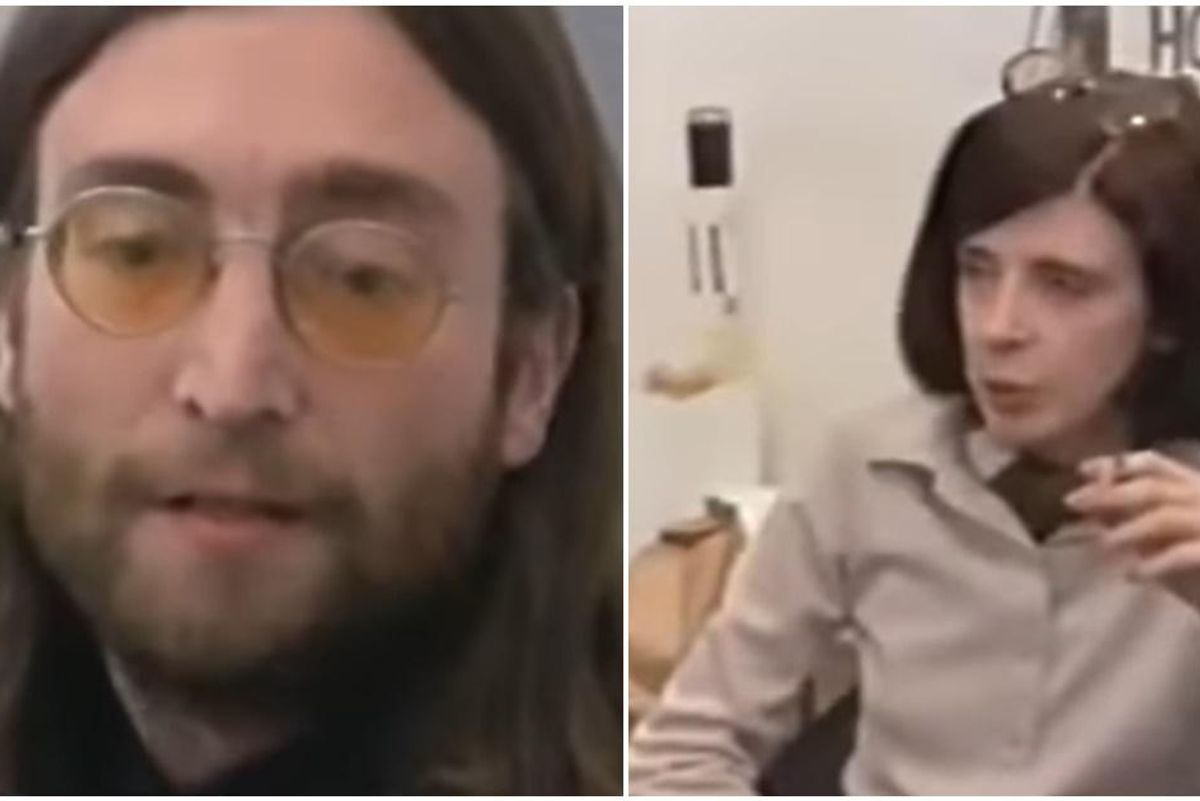John Lennon’s confrontation with a reporter over peace protests is something you never see
John Lennon and Gloria Emerson.
John Lennon of the Beatles was a uniquely gifted musician, writer, actor, visual artist and performer whose talents made him one of the most beloved people on the planet. However, his unique approach to activism in the ’60s and ’70s was mocked in its time but today seems just as visionary as his other talents.
Lennon’s first big political statement was the 1968 hit “Revolution,” which challenged those who want to “change the world” through institutions to “free your mind instead.” In 1969, he created one of the most enduring anti-war anthems, with “Give Peace a Chance.”
The easy-to-sing chorus was designed to be chanted by large groups of people and was a major refrain in the massive Vietnam Moratorium march in Washington in the fall of 1969.
As a member of the most popular pop group of all time, Lennon knew the power of the media and how to craft messages that caught the world’s attention.
After Lennon wed artist Yoko Ono on March 20, 1969, the couple knew it would be a major media event. So they decided to take the attention and use it as an advertisement for peace by staging a two-week-long bed-in at the Hilton Hotel in Amsterdam and the Queen Elizabeth Hotel in Montreal.
The couple invited the international press into their hotel beds, and many thought there would be something salacious happening, only to find Lennon and Ono making the case for peace.
Seven months later, the couple was challenged for their anti-war activities by celebrated war correspondent Gloria Emerson, who had just returned from the frontlines in Vietnam. Emerson, a serious journalist who saw the bloodshed firsthand, thought that Yoko and Lennon’s activism was silly self-promotion.
The exchange between the three is engaging because they all want peace but have zero agreement on how it can be accomplished.
John Lennon interviewed by Gloria Emerson
"You've made yourself ridiculous!" Emerson insists.
"I don't care," Lennon replied, "if it saves lives."
"My dear boy," she said, "you're living in a nether-nether land. . . . You don't think you've saved a single life!" Emerson says.
"You tell me what they were singing at the Moratorium," Lennon shot back.
"Which one?" Emerson asks.
"The recent big one," Lennon explained. "They were singing ‘Give Peace a Chance’ … and it was written specifically for them."
"So they sang one of your songs," she said with some irritation. "Is that all you can say?"
"They were singing a happy-go-lucky song, which happens to be one I wrote. I'm glad they sang it. And when I get there, I'll sing it with them," Lennon responds.
Throughout the back and forth Lennon calls Emerson a "snob" and she responds by calling him a "fake." Lennon tries to explain that he's doing an "advertisement campaign for peace." To which she cleverly responds, "Are you advertising John Lennon or peace?"
The argument is a wonderful example of a bygone era when celebrities were challenged by reporters. In 1969, Lennon was one of the most well-known and beloved people on planet Earth and Emerson has no problem challenging him. Can you imagine a reporter confronting someone of that status on the topic of activism in 2021?
The exchange is also refreshing because Lennon has no qualms about protecting his public image. He doesn’t care if he’s seen as a clown as long as he makes his point to as many people as possible. It's a lot different than the type of celebrity "slacktivism" we see today where all they do is send out a tweet or reply to a hashtag.
There’s no real way to quantify whether Lennon’s songs and activism helped change the tide of the war, but there’s no argument over whether he was successful at presenting his message of peace to the world.
In the interview, Emerson accuses Lennon of being a half-hearted activist who lacks commitment but, in the coming years, the former Beatle and Ono would continue to engage in anti-war activism.
The couple’s political activism would cool off by the mid-’70s after being threatened by the Nixon administration with deportation.
John Lennon was murdered in New York City on December 8, 1980, 41 years ago to the day this article was written.
- Paul McCartney composing 'Get Back' (January 7, 1969) - Upworthy ›
- Inside the Beatles' messy breakup, 50 years ago - Upworthy ›
- The message behind John Lennon's 'Imagine' is more relevant than ... ›
- Sting sings his rarely performed song 'Russians' as 'a plea for our common humanity' - Upworthy ›
- John Lennon's son, Julian, covers 'Imagine' at Ukraine benefit. - Upworthy ›
- Inside the Beatles’ messy breakup, 50 years ago - Upworthy ›
- Maya Angelou reads slain Gaza activist's email on aloneness - Upworthy ›
- An NFL reporter was criticized for consoling the losing coach, then fans came out to defend her - Upworthy ›

